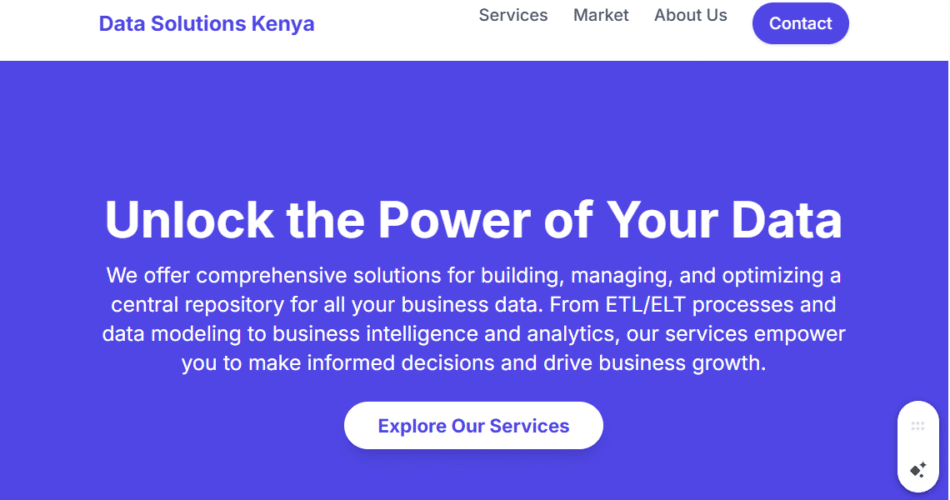Data Warehouse Services Kenya:
- Delivery Time2 Weeks
- English levelProfessional
- LocationUSA, United Kingdom, United Arab Emirates, Nairobi, Kilimani, Kenya, Dubai, CBD Nairobi, Canada, Australia
Service Description
The cost of Data Warehouse Services in kenya is 900000KES.Get Data Warehouse Services in kenya at a price of 800000KES at Black Shepherd Technologies.
Unlock the power of your data with expert data warehouse services in Kenya. We offer comprehensive solutions for building, managing, and optimizing a central repository for all your business data. From ETL/ELT processes and data modeling to business intelligence and analytics, our services empower you to make informed decisions and drive business growth. Transform disparate data into a single source of truth for enhanced reporting and strategic insights.
Data warehouse services in Kenya are becoming increasingly vital for businesses looking to leverage their data for a competitive edge. As organizations generate and collect data from various sources—such as sales transactions, marketing campaigns, customer relationship management (CRM) systems, and financial records—it becomes challenging to analyze this information effectively for business intelligence. A data warehouse provides a solution by acting as a central, integrated repository for all this data, a single source of truth that is optimized for analysis and reporting.
A data warehouse is not just a database; it is a complex system designed to support analytical queries and business intelligence activities. Key characteristics include being subject-oriented, integrated, time-variant, and non-volatile. This means the data is organized around core business subjects (e.g., sales, customers), it’s integrated from different sources to ensure consistency, it provides a historical perspective over time, and it’s a read-only environment where data is not updated or deleted in real-time. This stability is crucial for consistent historical analysis and reporting.
The implementation of a data warehouse typically involves a multi-layered architecture and a process known as Extract, Transform, Load (ETL) or Extract, Load, Transform (ELT). In the ETL process, data is extracted from source systems, cleansed and transformed to a consistent format, and then loaded into the data warehouse. ELT, on the other hand, loads the raw data first and performs the transformations within the data warehouse itself, often leveraging the powerful processing capabilities of modern cloud-based solutions.
In Kenya, data warehouse service providers offer a range of solutions tailored to the needs of local businesses, from small and medium-sized enterprises (SMEs) to large corporations. These services can include:
1. Data Warehouse Architecture and Design: This involves creating a blueprint for the data warehouse, including choosing the right technology (cloud-based like Microsoft Azure, AWS, Google Cloud, or on-premises solutions), designing the database schemas (e.g., star schema, snowflake schema), and planning for scalability and performance.
2. Data Integration (ETL/ELT): Providers build and manage the data pipelines that extract data from disparate sources, ensuring it is properly transformed and loaded into the warehouse. This is a critical step for maintaining data quality and consistency.
3. Business Intelligence (BI) and Reporting: Data warehouse services are often closely tied to BI. Companies help their clients build dashboards, generate reports, and use analytical tools (like Microsoft Power BI or Tableau) to visualize the data and derive actionable insights.
4. Data Modeling and Optimization: This involves structuring the data in a way that is most efficient for analytical queries. It can include creating data marts (subsets of the data warehouse for specific business units) to provide a focused view of the data for different teams.
5. Cloud-Based Solutions: Many providers in Kenya are leveraging the power of cloud computing to offer scalable, cost-effective data warehousing solutions. Cloud data warehouses provide the flexibility to scale resources up or down as needed, eliminating the significant upfront investment of on-premises hardware. They also offer enhanced security, disaster recovery, and operational savings by outsourcing infrastructure management to the cloud provider.
6. Data Governance and Security: Ensuring the security and integrity of data is paramount. Service providers establish data governance policies and implement security measures to protect sensitive information, manage user access, and ensure compliance with relevant regulations.
By partnering with a data warehouse service provider in Kenya, businesses can overcome the challenge of data silos and fragmented information. They gain a unified view of their operations, enabling them to analyze historical trends, forecast future outcomes, and make evidence-based decisions. This leads to improved operational efficiency, better customer service, and a stronger competitive position in the market. As the digital economy in Kenya continues to grow, data warehousing will remain a foundational technology for any organization aiming data driven and innovative.
The data warehouse is no longer a luxury reserved for large, multinational corporations. In Kenya’s dynamic and rapidly evolving digital landscape, it is becoming a necessity for businesses of all sizes to remain competitive. By centralizing and structuring data, a data warehouse empowers organizations to move from reactive to proactive decision-making, transforming raw data into a strategic asset.
The continued investment in digital infrastructure and the emergence of specialized local service providers mean that businesses in Kenya can now access sophisticated data warehousing solutions that are both scalable and cost-effective, particularly with the rise of cloud-based platforms. As the nation solidifies its position as a “Silicon Savannah,” the ability to harness the power of data will be a key differentiator, enabling companies to unlock new opportunities, enhance operational efficiency, and drive sustainable growth in the years to come








